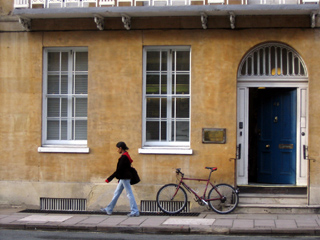Following hard upon questions of content and structure is another essential decision related to the thesis: what font to print it in. The obvious choice, based on past form, would be Garamond (the font used in the banner atop this page). It is definitely a more elegant font than the ubiquitous Times New Roman, but it is rather too common itself. Bembo is an older and rarer variant, which I believe was used to print the hardcover edition of The Line of Beauty. Cheltenham Book is an option I am considering.
For ease in reading, as well as general aesthetics, I strongly prefer a serif typeface. Indeed, if there were any apart from Times likely to be on any computer someone would use the blog from, I would use a serif typeface here. As it stands, it will use one of the following sans serif typefaces, in decreasing order of preference: Lucida Grande, Verdana, Arial (a bad ripoff of Helvetica, but very common), and whatever the system standard Sans-Serif is. Because of the font collections included in each OS, Mac users are likely to see Lucida Grande, while Windows users are likely to see Verdana.
Are there any other people out there who check the front pages for a blurb on the font before starting a book? If so, do you have any suggestions?
One final matter typographical: North American Mac users in Oxford, and there are a good many, will appreciate learning that you can make the Pound symbol (£) by hitting Option-3.



